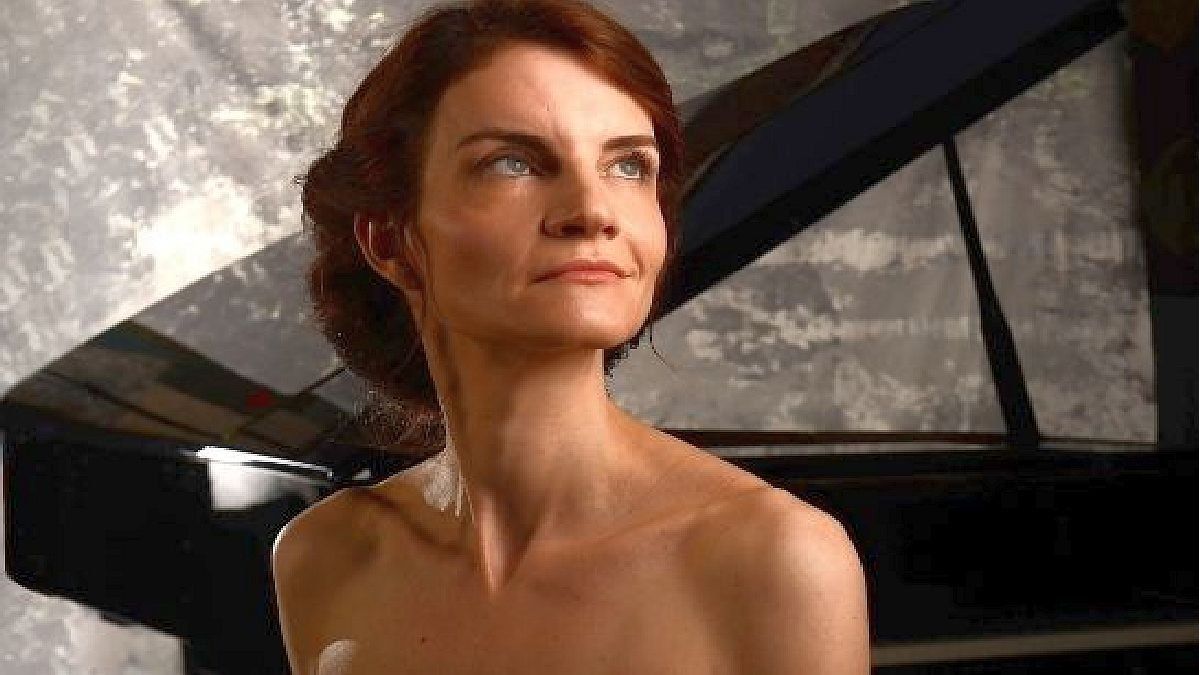Betty Gambartes: It is based on real events that one fictionalises, as we did with Homero Manzi or ´Discepolín y yo´. In those two works there was the poetry of the tangos and the biographical elements, with that material I built the work. Here it is the same but instead of poets of popular music it is music of the German romanticism of the 19th century.
Q.: Why classical music?
BG: It arose from a conversation with Eduardo Delgado and the search to be able to approach classical music in a different way, not like the conventional pianist’s recital. Along with Diego Vila, the figure of Clara appeared, who was the rockstar of the 19th century, her success was tremendous, they even made a cake with her name, they idolized her. She was a child prodigy and went from celebrity to her marriage to Schumann, her friendship and passion for Brahms. Her life has a lot of controversies, we took one of her and developed it.
Q.: What can you say about that controversy?
BG: They criticized her and said everything about her, even today. I remember one day leaving the Colón, where I teach, a student saw that she was reading about Wieck and asked me what I was doing with Clara Schumann, she is not known by Wieck, that student told me that she hated her. It happens that Robert Schumann, one of the greatest musicians of the 19th century, fell ill and it was she who took him to an insane asylum. It was two and a half years that he was there and she never went. They told him in the asylum that her presence made him more nervous, that it was not convenient for him to see her, but well, a lot was said about her and that in that period of great melancholy and pain, the one who was always present was the great friend of both, Brahms. That gave us the possibility to fictionalize and create.
Q.: How did you build the story?
BG: Clara appears before the public and comes to this day to talk about her. She admits that they criticize her and tells us, on one of her birthdays, her vision of her life. She brings music and dialogues with the public. The music is one more character, embodied on the piano by Delgado and I sing by Víctor Torres, who is in charge of the lieder, the songs of Schumann.
Q.: What revelations are there about Clara?
BG: She says that she is the object of criticism and bad intentions. No one thinks what happened to that person. Clara was the mother of 8 children, two of whom died, she had a tremendous life, an extraordinary success as a pianist, less so as a composer, and she had to support her family. In her 14 years married to Schumann, the last of hers were those of her asylum, where he died. There is Clara’s struggle as a single and brilliant woman, who allows us through her to approach the music and the musical world of that period. To highlight, the very beautiful costumes of Graciela Galán.
Q.: Behind every great woman is there a great man?
BG: There is a vindication of this woman and how in life there are chiaroscuro. You see the competition and envy between the two, the macho thought of Schumann and Clara all her life dedicated to spreading the work of her husband, and also that of Brahms. They called her the priestess, because of her vocation to serve her towards the music of the two of them.
Q.: How do you see this moment in the performing arts?
BG: With concern, interest and the desire that people need to return to the theater. That consecration in the work does not exist until the public is not there, it only exists if that dialogue is installed.
Q.: Is classical music still reserved for a smaller portion of the public?
BG: For me, tango is the same as classical music, there is no difference, it is music. When I did ´Arráncame la vida´ I got involved with bolero and people looked at me with disgust, despising the genre. I defended him and beyond the distance of ideas that we had with Chico Novarro in the last stage and the problems that arose, it was a success. My interest is to erase those barriers, that one enjoys the same. Today it is more difficult for the public to come to see an hour and a quarter recital of a classical music soloist, at this speed in which we live, then we were interested in the concept of dramatic work with classical music, that was the engine that impulse.
Source: Ambito
David William is a talented author who has made a name for himself in the world of writing. He is a professional author who writes on a wide range of topics, from general interest to opinion news. David is currently working as a writer at 24 hours worlds where he brings his unique perspective and in-depth research to his articles, making them both informative and engaging.




